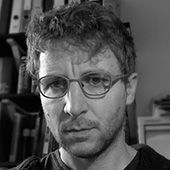
Private: Dr Patrick Allo
Former
patrick.allo@vub.ac.be
The question of what has to be done to ensure that information can be obtained, organised, and be placed in the right context is a concern that the philosophy of information shares with information architecture; the practice – and associated discipline – of deciding how to arrange the parts of something to be understandable (“What is Information Architecture?” The Information Architecture Insitute).
A dialogue between these two disciplines was initiated during a workshop held at the University of Oxford in June 2016. It included presentations that address the role of design as it applies to the conception of informational artefacts and the way we shape and organise the infosphere by Vicky Buser, Luke Church, Terence Fenn, Andrew Hinton, Jason Hobbs, Dan Klyn, Andrea Resmini, and Konstantin Weiss.

© David Peter Simon — Dan Klyn on patterns in architecture.
By publishing a special issue of the journal Philosophy and Technology on this topic, we want to give the original participants to the workshop the opportunity to publish the work they initially presented, create a permanent record of the thoughts exchanged during that workshop, and at the same time open up this ongoing dialogue to neighbouring disciplines, and welcome contributions and input from scholars as well as practitioners interested in information architecture, designing a better infosphere, and more general ethical and philosophical perspectives on design practices and digital technologies.
The project we’d like to put forward as editors is the study of theoretical questions related to design as an epistemic practice, and the practical challenges that arise from technological changes like the blurring of the boundaries between offline and online, or between the digital and the physical. This blurring is the central concern of pervasive information architecture, a recent development in information architecture that is explicitly concerned with how information is conveyed and/or accessed across many mediums, contexts, and levels of abstraction. Such developments have rendered most of our interactions with information messier than ever before, have radically altered the nature of the infosphere, and raise issues that will only become more urgent with the proliferation of environments where human and non-human ways of understanding and processing information co-exist.
Addressing these concerns calls for innovative design solutions as well as for deeper conceptual understanding. We need better ways of understanding, conceptualising, and expressing the design challenges and requirements that arise from the abundance of semantically and technologically heterogeneous informational contexts.
The editors expect to receive expressions of interest by the 26th of July 2017 (a title, and 200-300 word description of the topic to be sent by email to patrick.allo@oii.ox.ac.uk), and will provide feedback on the basis of these proposals. Full papers should be submitted by the 26th of September 2017 via the journal’s online submission system, as a special article type “SI on Information Architecture and the Design of the Infosphere”.
Download the official call for papers here.
The editors
Andrea Resmini
David Peter Simon
Patrick Allo